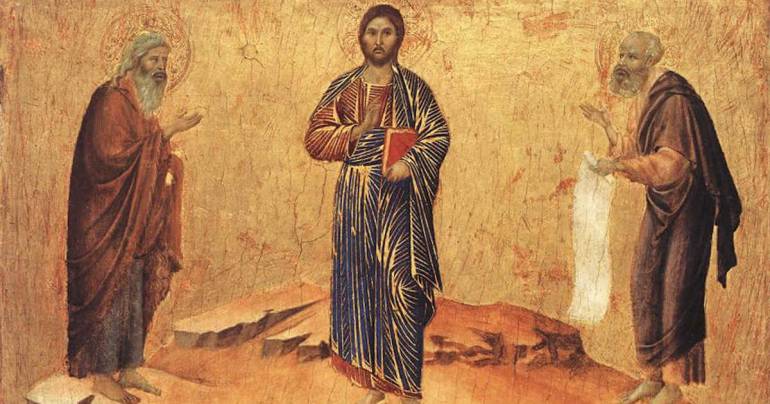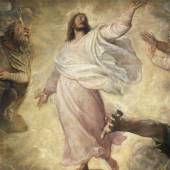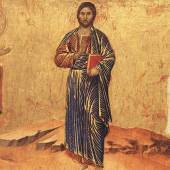'Listen to him' (Matthew 17,1-9)

“Listen to him” (Matthew 17,1-9)
A. Text:
After six days Jesus took Peter, James, and John his brother, and led them up a high mountain by themselves. And he was transfigured before them; his face shone like the sun and his clothes became white as light. And behold, Moses and Elijah appeared to them, conversing with him. Then Peter said to Jesus in reply, "Lord, it is good that we are here. If you wish, I will make three tents here, one for you, one for Moses, and one for Elijah." While he was still speaking, behold, a bright cloud cast a shadow over them, then from the cloud came a voice that said, "This is my beloved Son, with whom I am well pleased; listen to him." When the disciples heard this, they fell prostrate and were very much afraid. But Jesus came and touched them, saying, "Rise, and do not be afraid." And when the disciples raised their eyes, they saw no one else but Jesus alone. As they were coming down from the mountain, Jesus charged them, "Do not tell the vision to anyone until the Son of Man has been raised from the dead."
B. Exegesis:
1. The whole world is going through a severe politico-economic crisis. The health and the wealth of the masses have drastically dropped. Wars, conflicts, and acts of terror disturb the peace and prosperity of nations, along with a looming ecological crisis. Simultaneously, we all go through a spiritual aridity. Hence, we need to look up and listen to the Heaven.
2. Up on a high mountain
In today’s Gospel drama, we see Jesus going up “a high mountain.” On the mountain, He is transfigured.
Then appear two figures who are also linked to a mountain, Mount Sinai. God revealed to Moses on Sinai: Exodus 19-20; God revealed to Elijah on Horeb = Sinai: 1 Kings 19.
Moses and Elijah represent the Law and the Prophets of the Old Testament. They represent the Old Testament and have got something to talk about.
3. Lo, comes a cloud
In the wilderness the cloud covered the Meeting Tent (Exodus 40,34-35). Later, it came to rest upon the Temple of Jerusalem at the time of its dedication (1 Kings 8,10). Hence the cloud indicates the Lord’s presence amid His people.
Once again it casts its shadow. Yes, the Lord is present now.
4. From the cloud comes a voice
Once the heavenly voice identified Jesus as “This is my beloved Son, with whom I am well pleased” (3,17); that was at His Baptism before He undertook the Galilean ministry.
Once again, the heavenly voice identifies Him as “This is my beloved Son.” That was after He announced the destination of His ministry, the Paschal Mystery in Jerusalem, the city of destiny, “From that time on, Jesus began to show his disciples that he must go to Jerusalem and suffer greatly from the elders, the chief priests, and the scribes, and be killed and on the third day be raised” (16,21).
- “And when the disciples raised their eyes, they saw no one else but Jesus alone.” Only Jesus will be left as the Teacher whose Words must be heeded. It is only Him that the heavenly voice will identify as the one to be listened to now, “Listen to Him.”
5. Response of Disciples
When Jesus’ divinity is revealed in such a privileged way, how do His disciples respond?
Of them, Peter opens his mouth but not knowing what he is going to say. Oh, he feels so happy that he likens his joy to the joyful celebration of the harvest festival of Tabernacles: “Lord, it is good that we are here. If you wish, I will make three tents here, one for you, one for Moses, and one for Elijah.”
The Israelites dwelt in booths during the journey from Egypt to the Promised Land Leviticus 23,39-42: “… when you have gathered in the produce of the land, you shall celebrate a pilgrim feast of the Lord for a whole week … for a week you shall make merry before the Lord, your God … during this week every native Israelite among you shall dwell in booths.” And so Jews of Jesus’ day too live in booths during the liturgical feast of the Tabernacles reliving their ancestral experience.
The joy of Peter turns to that liturgical custom.
C. Application:
6. Pragmatics
How do we now apply this Transfiguration of Jesus to our own lives? In his book, ‘Something Beautiful for God,’ Malcolm Muggeridge describes the impact that Mother Teresa had upon an audience of people, saying, “Every face … was rapt, hanging on her words; not because of the words … but because of her. Some quality came across, over and above the words, that held their attention. A luminosity seemed to fill the school hall … penetrating every mind and heart.”
This story of Mother Teresa helps us fathom, at least to some degree, the depth of impact that the Transfigured Jesus had upon His disciples. The whole event of the Transfiguration is a moment of grace for the disciples. It is a moment, when the border between heaven and earth appears to fade for a brief second. It is a moment, when, for a split second of time, God’s presence touches their lives deeply. It is a moment when, for a split second of time, they are blessed with a faint glimpse of eternity and God’s glory.
Jesus can impact our lives even today – especially when we are faced with the predicaments and vicissitudes of life. Like Jesus’ disciples who entered the cloud, we too can enter the mystery of God by listening to Him. “Behind the dim unknown, standeth God within the shadow, keeping watch above his own,” as James Russell Lowell said.
7. How do we listen to Jesus today?
God instructed the disciples of Jesus on the high mountain to listen to Him. It was a time when they failed to listen to Him and His words on the impending passion, death, and resurrection in Jerusalem.
The Paschal Mystery has been a mystery for all ages. It remains a mystery to us as well today. But we need to listen to Him. We need to listen and obey the Word of the Lord, like Abraham, our Patriarch, who “went as the Lord directed him …” (Genesis 12) from “the land” of his kinsfolk and from his “father’s house” to “a land” that the Lord would show him.
In 1984 Velma Barfield, an American serial killer, was the first woman in 22 years to be executed in USA and the first woman to be executed by lethal injection. In prison this ‘Death Row Granny’ underwent a conversion. Evidence of it appears on every page of her Bible, which she read on daily basis. She, caught up in the daily struggle of prison life, once told a friend, “This Bible is where I get my strength. I could not get up in the morning much less go through the day without his Word.” Yes, we need to listen to Jesus through His Word today!
Radio Veritas Asia (RVA), a media platform of the Catholic Church, aims to share Christ. RVA started in 1969 as a continental Catholic radio station to serve Asian countries in their respective local language, thus earning the tag “the Voice of Asian Christianity.” Responding to the emerging context, RVA embraced media platforms to connect with the global Asian audience via its 21 language websites and various social media platforms.














